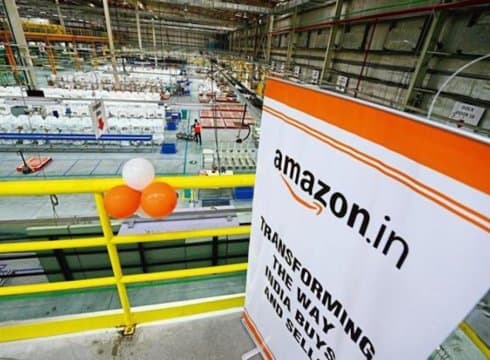Amazon, Grofers, Bigbasket Look To Invest About $695 Mn Combined In Food Retail
Inc42 Daily Brief
Stay Ahead With Daily News & Analysis on India’s Tech & Startup Economy
Amazon will soon get DIPP approval to invest the proposed $500 Mn amount in a wholly-owned food retail venture in India, over a five-year period.
Post DIPP approval, Amazon can then stock locally produced food items and sell them online. This will further give impetus to Amazon’s plans of opening food retail stores in India.
Earlier, hyperlocal online grocery retailers Bigbasket and Grofers had also applied for approvals under this category. Reportedly, DIPP has received a proposal for a total investment of $695 Mn in the food retail category.
Amazon And Food Retail In India
Amazon first made the investment proposal in February 2017, exactly a year after the government allowed for 100% foreign investment (FDI) in food retail in India.
In July 2016, Amazon India had launched Amazon Pantry, a service that offered grocery and household essentials and even delivers orders in a day. Competing with retail chains such as Big Bazaar and Spencer’s, Amazon Pantry aims to replicate the supermarket model online, that can deliver products up to 15 kgs per delivery. Also, Amazon Pantry will be accessible to all customers in India, whereas globally, it is only available to Amazon Prime customers, as stated by the company in an official statement at the time of launch.
Prior to that, in February 2016, Amazon had also launched its grocery delivery app in India, Amazon Now, to allow users to order everyday essentials. Also, in March 2015, Amazon had launched an express delivery platform for grocery called KiranaNow in Bengaluru.
Food Retail In India: An Ongoing Battle
The online food retail space in India has become a tough space, lately. Space has seen its share of shutdowns and consolidations, but this has not stopped the companies – both homegrown and foreign – from trying their luck.
In March this year, US-based multinational retailing corporation Walmart announced its plans to open nearly half of 50 new stores in Uttar Pradesh (UP) and Uttarakhand over the next three-to-four years. The company is apparently waiting for clarity on food retail guidelines as specified by the government, as they do not want to limit themselves to domestically produced and manufactured food products.
Along with Walmart and Amazon, homegrown ecommerce unicorn Flipkart is also planning to enter the grocery category again. Flipkart initially entered this space with the launch of Flipkart Nearby in October 2015. However, as a restructuring move, it shut Nearby down in February 2016.
Prior to this, in October 2016, autorickshaw aggregator Jugnoo had launched a new service ‘Grocery.’ Under the service, grocery orders are delivered by auto-rickshaw drivers during their free time.
But as space has been seeing some tough times, the failures outnumber the successes. To date, out of 74 hyperlocal grocery startups, 20 have shut down operations completely.
In April 2016, PepperTap announced that it will shut down its customer-centric grocery delivery app. In January 2016, Grofers had shutdown its operations in nine cities and Shadowfax restricted its operations to only three cities so as to focus on generating cash flow and achieving operational efficiency. Also, in April 2015, Alibaba-backed-Paytm launched a new app called Paytm Zip to connect users to both local offline as well as online grocers but later closed it down. Ola, too, tried its hand at grocery delivery, accompanied by Tata Group.
However, sentiment became more positive towards the end of 2016 and the sector has also attracted funding. In December 2016, Gurugram-based on demand hyperlocal delivery services startup, Shadowfax raised $10 Mn (INR 67 Cr) as part of its Series B funding. In March 2017, Bengaluru-based online grocer Bigbasket raised about $6.9 Mn (INR 45 Cr) venture debt from Trifecta Capital.
Other startups working in the space include ZopNow, Satvacart etc.
Food Retail In India: FDI Updates And Future Trends
Despite being known as an agricultural economy and home to major food retail chains like HUL, food retail in India has been unable to attract much foreign investment in the category. As disclosed by the DIPP in an IBEF report, the food processing sector in India has received around $7.47 Bn worth of FDI during the period April 2000-December 2016.
As earlier stated by Food Minister Harsimrat Kaur Badal to ETRetail, “FDI inflows help bring new technologies, products, processes, and markets. Also, foreign investments in backward and farm-gate infrastructure in the supply chain would benefit farmers and processors, and create employment.”
Recently, in May 2017, the Union Cabinet scrapped the 25-year-old Foreign Investment Promotion Board (FIPB), which has been vetting FDI proposals requiring government approval. Under the new mechanism, the proposals will be approved by the concerned ministries, as per standard operating procedure approved by the Cabinet.
Some key trends observed by analysts in the Indian food retail market are:
- According to the IBEF, the Indian food and grocery market is the world’s sixth largest, with retail contributing 70% of the sales.
- The Indian food retail market is expected to reach $915 Bn (INR 61 Lakh Cr) by 2020.
- The Indian food processing industry accounts for 32% of the country’s total food market, and is ranked fifth in terms of production, consumption, export and expected growth.
- The Confederation of Indian Industry (CII) estimates that the food processing sectors have the potential to attract as much as $33 Bn of investment, over the next 10 years.
The development was earlier reported by ET Retail.
{{#name}}{{name}}{{/name}}{{^name}}-{{/name}}
{{#description}}{{description}}...{{/description}}{{^description}}-{{/description}}
Note: We at Inc42 take our ethics very seriously. More information about it can be found here.


